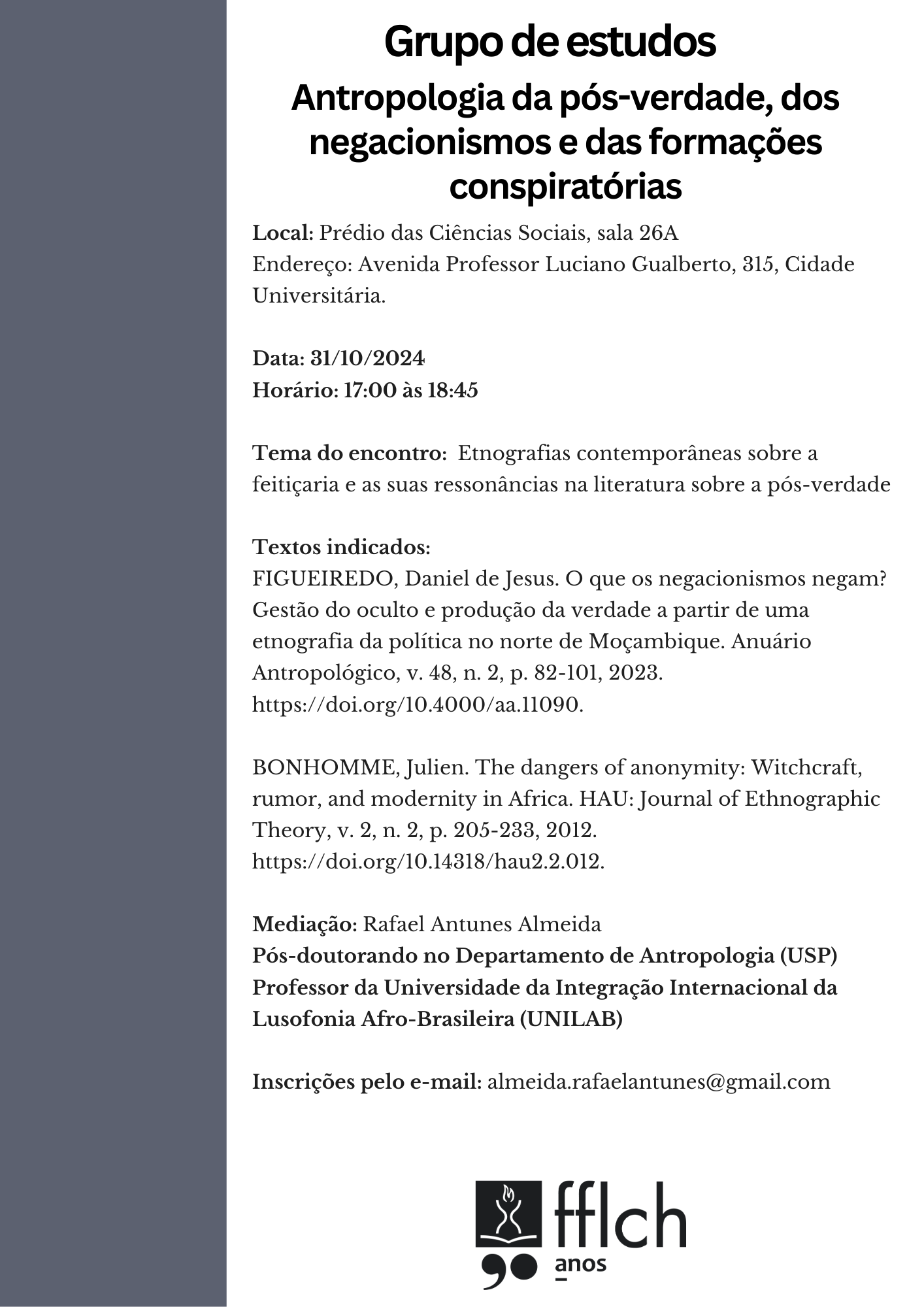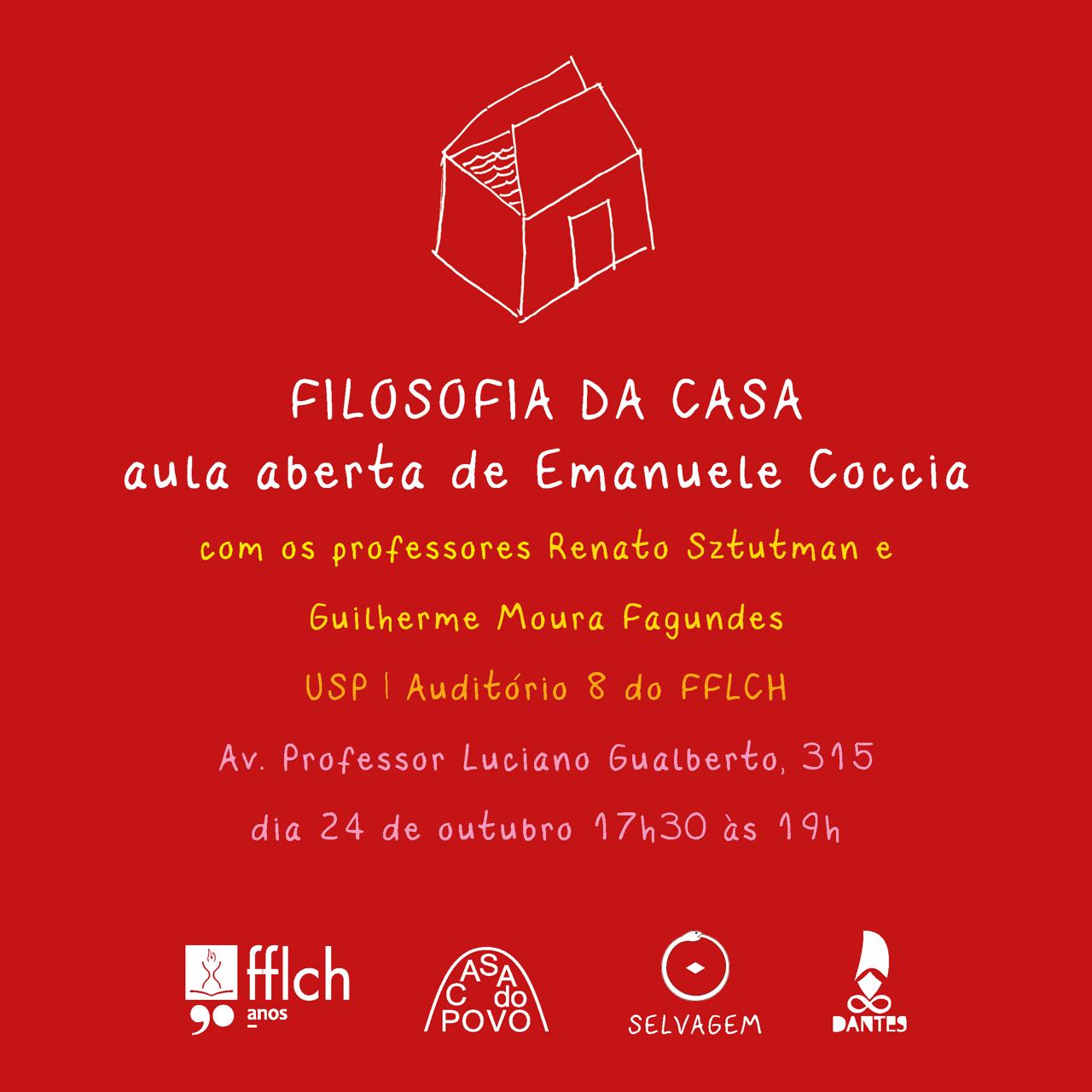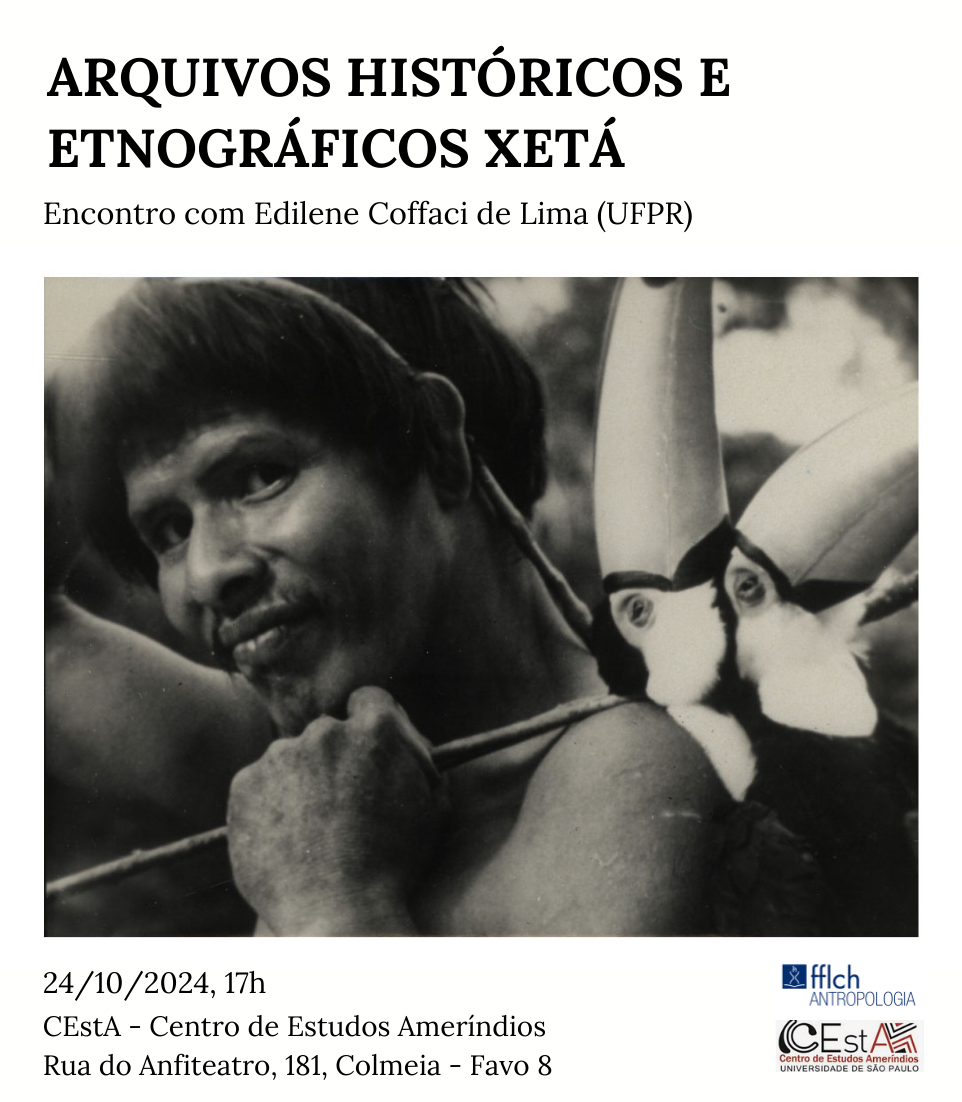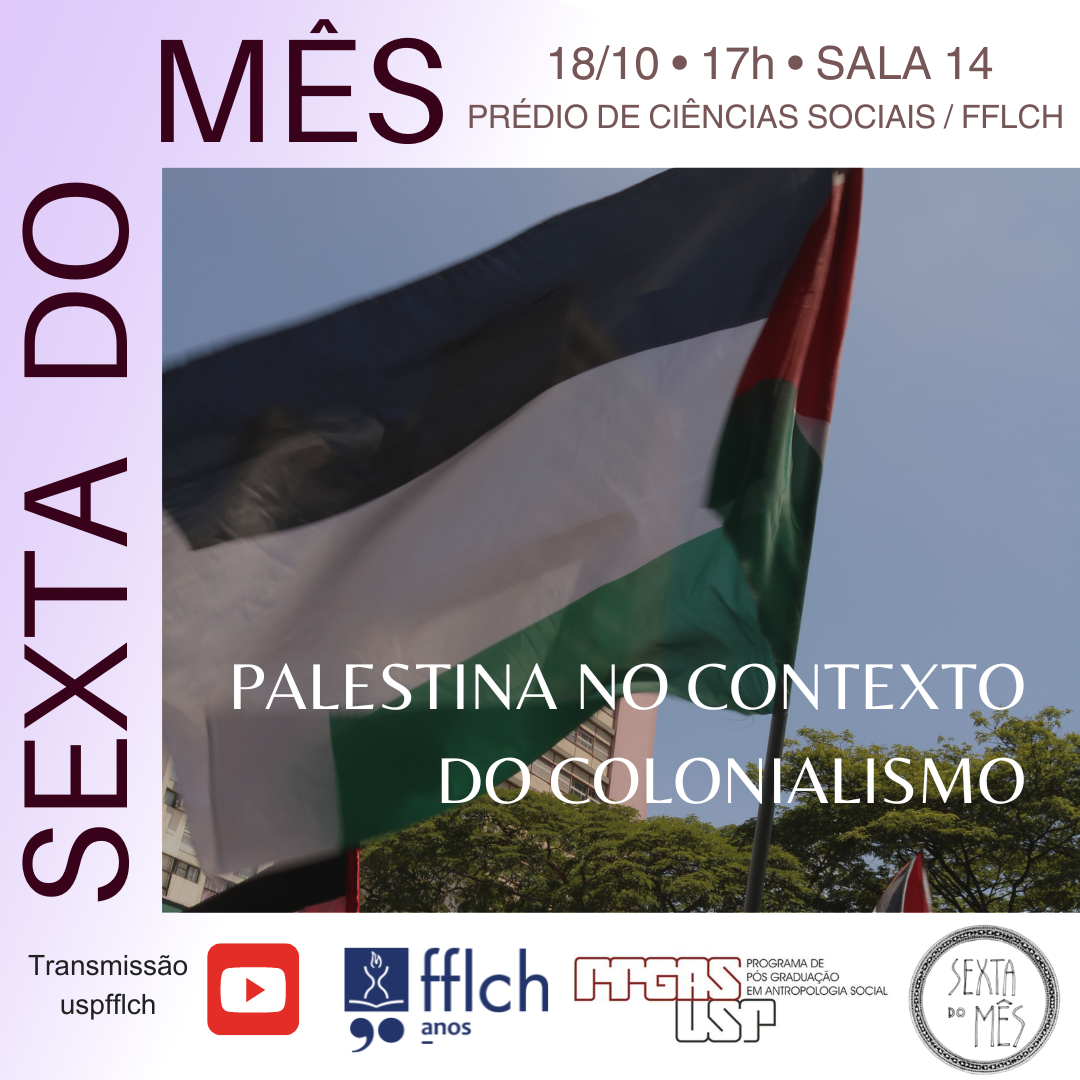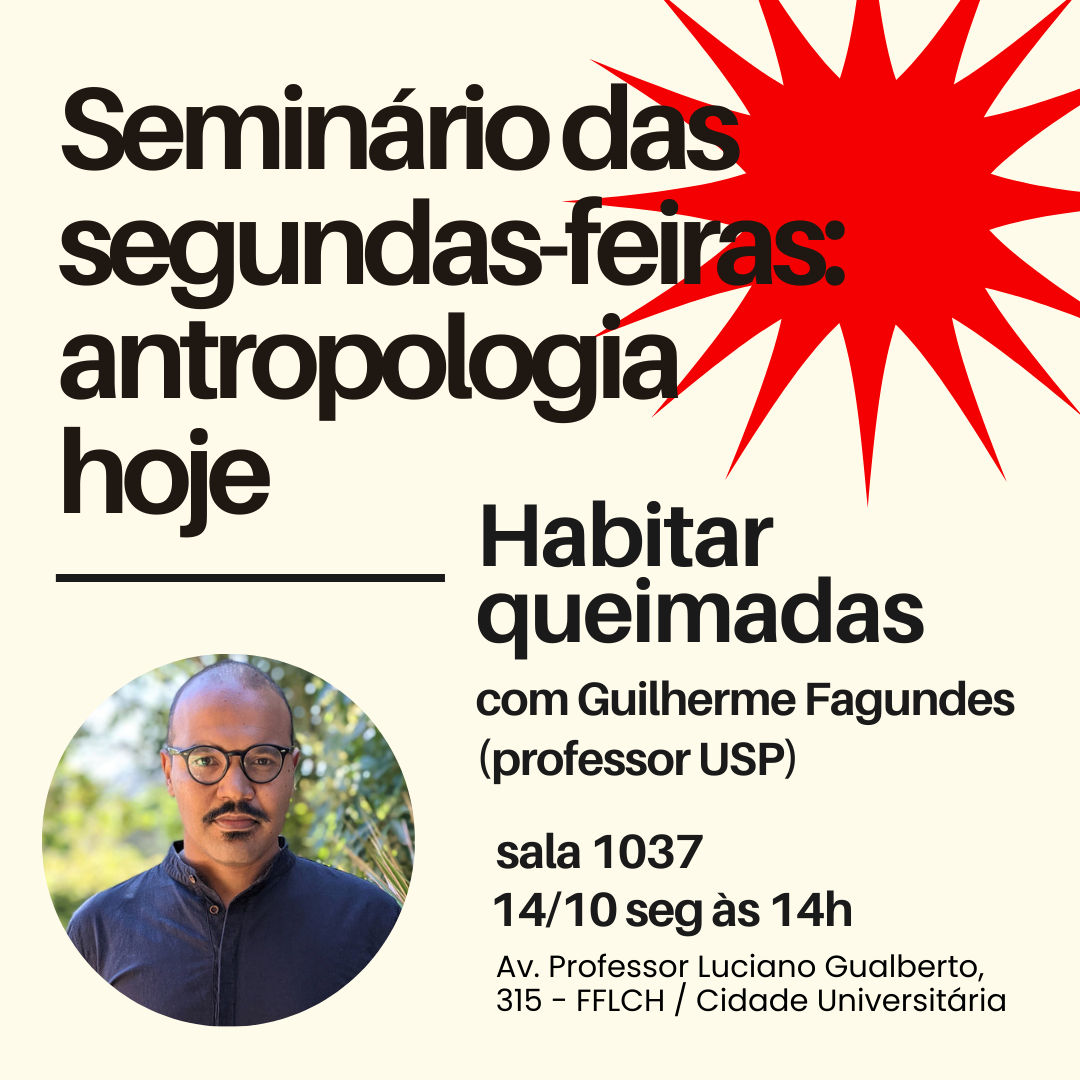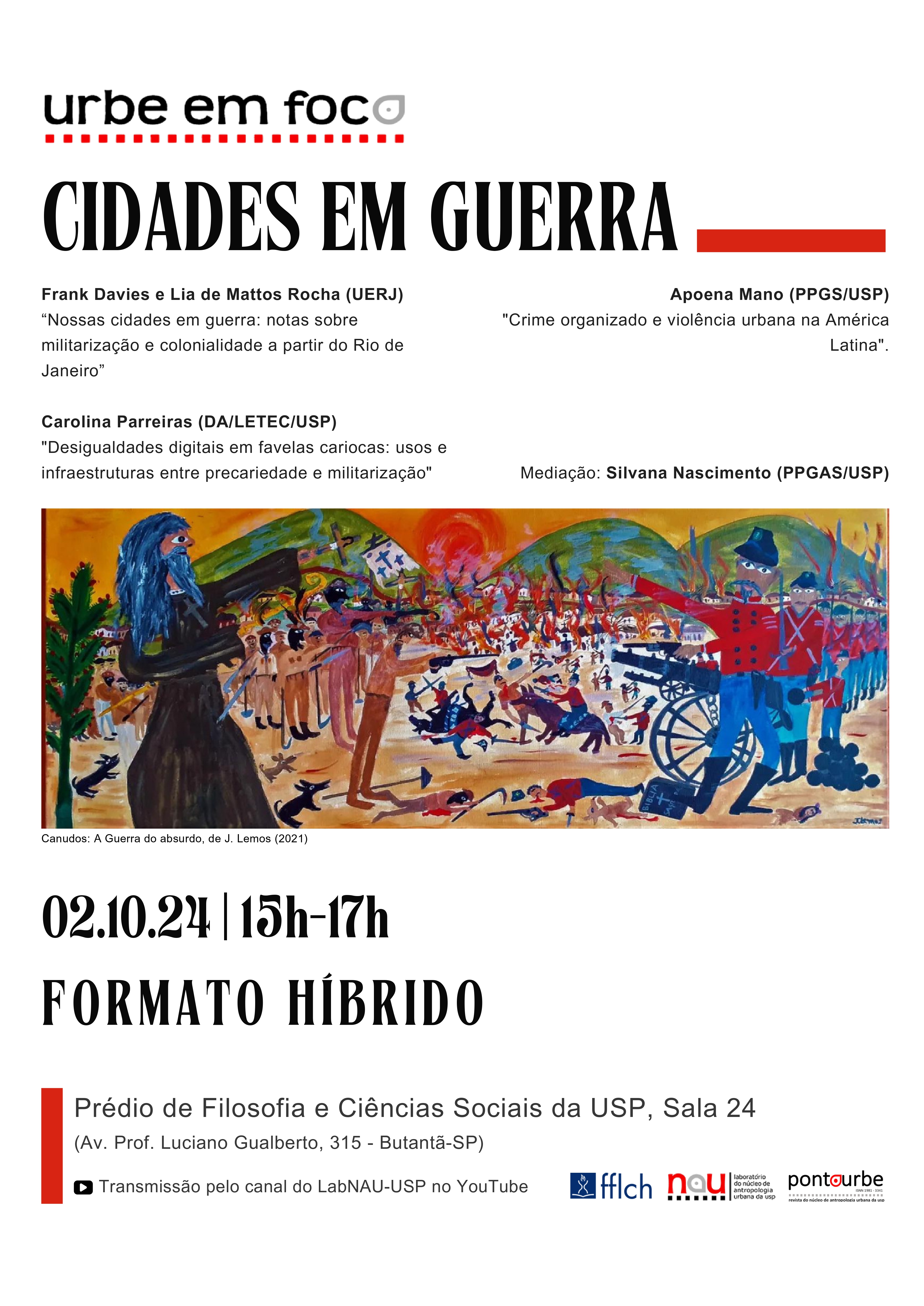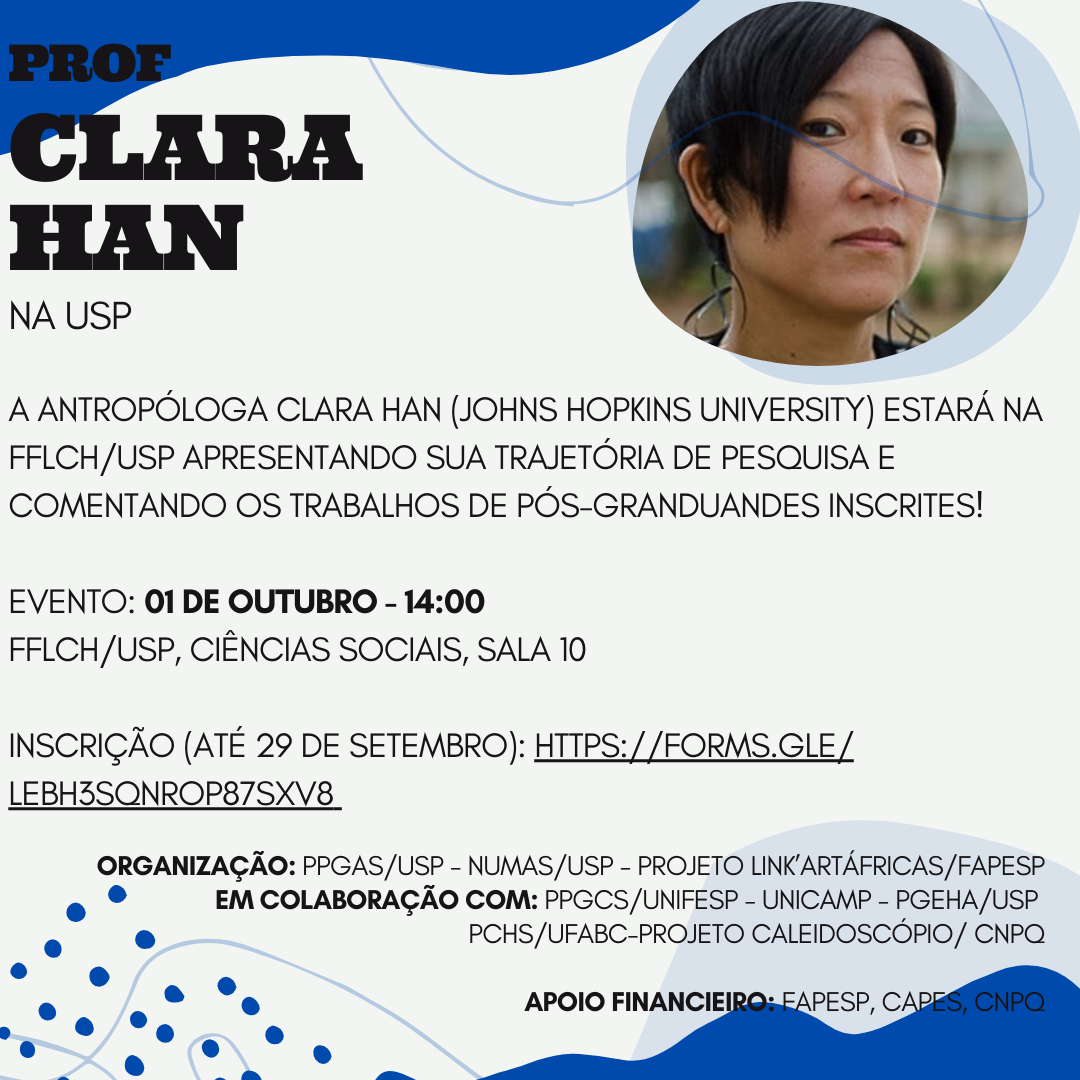Events
The Study Group "Anthropology of Post-Truth, Denialism and Conspiracy Formations" aims to analyze and discuss, from an anthropological perspective, the phenomena of post-truth, denialism and conspiracy theories.
Theme of the meeting
Contemporary ethnographies on witchcraft and its resonances in the literature on post-truth
The group will discuss the following texts:
-
FIGUEIREDO, Daniel de Jesus. What do denialisms deny? Management of the occult and production of truth based on an ethnography of politics in northern Mozambique. Anuário Antropológico, v. 48, n. 2, p. 82-101, 2023.
https://doi.org/10.4000/aa.11090 -
BONHOMME, Julien. The dangers of anonymity: Witchcraft, rumor, and modernity in Africa. HAU: Journal of Ethnographic Theory, v. 2, no. 2, p. 205-233, 2012.
https://doi.org/10.14318/hau2.2.012
Date: October 31, 2024
Time: 5:00 p.m. to 6:45 p.m.
Location: Social Sciences Building, room 26A
Address: Avenida Professor Luciano Gualberto, 315, Cidade Universitária
Target audience
The group is open to the entire university community.
Registration
Registration can be done by email: almeida.rafaelantunes@gmail.
Mediation:
Rafael Antunes Almeida
Post-doctoral student at the Department of Anthropology (USP)
Professor at the University of International Integration of Afro-Brazilian Lusophony (UNILAB)
In “Filosofia da Casa”, Emanuele leads us, through an intimate and delightful narrative, to explore living rooms, bedrooms, kitchens, bathrooms and memories, presenting the home as a place of connection with the world and with ourselves. The book, which has a foreword written by anthropologist Júlia de Sá Earp and illustrations by Luiz Zerbini, unfolds the experience of Metamorphoses (Dantes, 2021) proposing, this time, to enter the cocoons to, finally, resignify them.
Professors in charge: Renato Sztutman (FLA) and Jean Tible (FLP)
Mediation: Professors Renato Sztutman and Guilherme Fagundes.
The open class precedes the launch of the book Filosofia da Casa, which will take place at Casa do Povo, on 10/26. See I adopt.
Meeting with Edilene Coffaci de Lima (UFPR) at CEstA/USP, Thursday, 10/24/2024, at 5:00 p.m.
There is extensive documentation about the Xetá, an indigenous group that speaks the Tupi-Guarani language and was officially contacted just over 70 years ago in northwestern Paraná: from the Indian Protection Service (SPI), the Anthropology Department of UFPR, the Museu Paranaense, the Círculo de Estudos Bandeirantes, among other archives. I will present how research has been conducted based on the records of these institutions and others yet to be explored, such as the Minor Order of Capuchin Friars, as well as the Chambers and City Halls of municipalities that were built on their lands.
CEstA - Center for Amerindian Studies
Rua do Anfiteatro, 181, Colmeia - Favo 8
Cidade Universitária
Start: Friday, October 18, 2024, 5:00 p.m.
Location: Room 14 of the Social Sciences Building - Av. Prof. Luciano Gualberto, 315
With joy, Sexta do Mês invites everyone to the thematic table that will take place in October.
In the month in which the uninterrupted genocide against the Gaza Strip completes one year, the October edition of Sexta do Mês opens space for reflection on the experiences of exile, forced displacement and agency of the Palestinian people. In light of the new work by anthropologist Leonardo Schiocchet, entitled “Processes of Belonging and Social Organization among Arab Forced Migrants: Theoretical and Methodological Contributions”, published in 2024 by the Brazilian Anthropology Association (ABA) and Editora Fi, we propose the exercise of articulating ethnographic knowledge with the contemporary political scenario of the Middle East. The colonial occupation of Palestine, which began more than seven decades ago, is entering a new phase of violence and dispossession of the Arab-Palestinian population and, far from ending, is expanding to countries such as Lebanon, Iran and Yemen.
Schiocchet's work, by investigating how exile shapes both the identity and survival strategies of Palestinians, offers theoretical and analytical perspectives to understand the forms of agency and subjectivity that emerge in this complex scenario. Therefore, we invite everyone to the Friday of the Month “Palestine in the context of colonialism”, seeking to reflect on the position of anthropology in the midst of the “first televised genocide in history” and break with silence and omission.
Guests:
Leonardo Schiocchet (Researcher at the Institute for Social Anthropology of the Austrian Academy of Sciences and Senior Associate Researcher and Lecturer at the Institute for Social and Cultural Anthropology of the University of Vienna)
Bárbara Caramuru (Professor at the Department of Anthropology and Archaeology of the Federal University of Paraná)
Helena Manfrinato (PhD and Master's degree from the Postgraduate Program in Social Anthropology of the University of São Paulo - PPGAS/USP)
Mediation: Isabella Aquino (Master's student at the PPGAS/USP)
The panel is open to all audiences, so feel free to participate and bring colleagues.
There will be a live broadcast on the uspfflch channel on YouTube: https://www.youtube.com/@uspfflch
The Ethnographic Laboratory of Technological and Digital Studies (LETEC) and the Center for Studies on Social Markers of Difference (Numas) invite you to the launch and debate event for the book "We Need to Talk About Consent".
The debate will be held between the three authors: Arielle Sagrillo, Beatriz Accioly Lins and Silvia Chakian.
The book proposes a more detailed and qualified discussion on the concept of consent, central to various contemporary situations, and from different disciplinary perspectives.
The event will take place on October 18th, at 10 am, in Room 8.
Center for Anthropology, Performance and Drama (NAPEDRA/USP)
Center for Afro-Brazilian Arts at USP
Hybrid Event
Link to all sessions: https://meet.google.com/huf-vvvo-ckh
Schedule
October 14 (Monday)
– Online schedule via Zoom
● Afternoon (2:00 p.m.):
o Welcome from the organizing committee
John C. Dawsey, Pâmilla Vilas Good morning, Fernanda Marcon.
○ Canoe Path: between mirrors and water roots (conversation circle)
Carlos Corrêa Praude (UNB) Rita de Almeida Castro (UNB; NAPEDRA/USP) (remote).
○ Falling Bodies: A film, a massacre, a cyborg and the spiraling time of performance
Scott Head (GESTO/UFSC) (remote)
○ Around the World (Short Film Screening, 14’12)
Alice Villela (NAPEDRA/USP) (remote)
○ Andanças de Fé (Documentary Screening, 46’)
Carlos Alberto Corrêa Moro (UNICAMP; NAPEDRA/USP) (remote)
October 15 (Tuesday)
– Hybrid Zoom and in-person programming at the Mini Auditorium of LISA/USP
● Morning (9:00 am):
○ Medea after the Sun: trauma as performance, the character as a frown
Luciana Lyra (UERJ; NAPEDRA/USP) (remote)
○ Tragedy in performance: reflections on the play Antigone in the Amazon
Fernanda Marcon (NAPEDRA/USP) (in-person)
○ Risk and restoration: articulating gender, race and class in a classical ballet company in São Paulo
Carolina Paes de Barros (NAPEDRA/USP) (in-person)
● Afternoon (2:00 p.m.):
○ Minicourse: Youth and political activism: performances in struggle
Fernanda Marcon (NAPEDRA/USP) (in-person)
October 16 (Wednesday)
– In-person program Location: Mini-auditorium of LISA/USP
● Morning (9:00 a.m.):
○ Hey! Excuse me: the presence, experience and knowledge of women in capoeira (conversation circle)
Suelen Cristina Marcelino de Campos (FFLCH/USP) (in person)
○ Capoeira and performance: contributions and contradictions
João Luis Uchoa de Figueiredo Passos (NAPEDRA/USP) (in person)
○ Öwawé dahoimanadzé - Rio das Mortes vivo (film presentation)
Ana Lúcia Ferraz (UFF; NAPEDRA/USP) (in person)
○ The creative process: staging as a search for knowledge based on the encounter with Dona Mariana, the Turkish princess of the Amazon (from 2009 to 2024)
Zeca Ligiero (NEPAA/UNIRIO) - (in person)
● Afternoon (2:00 p.m.):
○ Minicourse: Youth and political activism: performances in struggle
Fernanda Marcon (NAPEDRA/USP) (in-person)
October 17 (Thursday)
– In-person program
Location: room 109, USP Social Sciences building ·
Afternoon (4:30 p.m.):
o Six readings of Brecht's play Mother Courage.
Presentations by the undergraduate class in Social Sciences: FLA 0364 Benjamin, Brecht and Anthropology
October 18 (Friday)
- Hybrid Zoom and in-person program at the LISA/USP Mini-Auditorium
● Morning (09:00):
○ Round thinking, performance and decolonial education: experiences of the Minas Novas Quilombo Campus in the Jequitinhonha Valley
Rubens Silva (NEPPAMCS/UFMG; NAPEDRA/USP) (remote)
○ Poetics of the backwater: the eternal return of Olímpio's ark Pâmilla Vilas Boas (NAPEDRA/USP) (in-person)
○ Folk songbooks and popular poetry
Maria Laura Viveiros de Castro Cavalcanti (RISU/UFRJ) (remote)
● Afternoon (2:00 p.m.):
○ Anthropology and seismology of performance
John C. Dawsey (NAPEDRA/USP) (in-person)
○ Nocturnal History of Ceilândia
João Campos (NAPEDRA/USP) (in-person)
○ Anthropology of performance: towards a pedagogical experience
Luiz Davi Vieira Gonçalves (Tabihuni/UEA) (remote) ○ Victor Turner from culturetype to Genotype
Robson Corrêa de Camargo (PPGPC/UFG; NAPEDRA/USP) (remote)
● Evening (7:00 p.m.):
○ Closing party at the Center for Afro-Brazilian Arts of USP Narratives of the Recôncavo Mestre Pinguim, Luiz Antônio Nascimento Cardoso.
Location: Center for Afro-Brazilian Arts of USP Av. Prof. Lúcio Martins Rodrigues, 5th block, block 28
Inhabiting fires
Monday, October 14 at 2:00 p.m. - Room 1037
The presentation will be based on the way in which the quilombolas of Jalapão (TO) inhabit the general environment. Instead of establishing static borders, buildings, and individualizing possession, it is a way of living that is expressed through wandering activities in areas with different temporalities of post-fire regeneration. In addition to demonstrating how this way of living broadens our understanding of the conditions of habitability at the time of large forest fires, the presentation will also seek to outline an ethnographic theory of quilombola freedom. In short, it is an experience of freedom that cannot be reduced to ecological autonomy, since it is guided by demands that are more than human, the effects of which have repercussions on a way of relating to fire that goes beyond its control.
Guilherme Fagundes is a professor in the Department of Anthropology at the University of São Paulo, where he leads the Anthropology, Environment and Biotechnodiversity Collective (CHAMA). He works mainly in the areas of technical anthropology and environmental anthropology, in addition to mobilizing the production of films, photographic essays and digital maps as a method of collaborative and multimodal ethnography. Over the last ten years, he has dedicated himself to studying the transformations in forest fires and the resumption of indigenous burning on a global scale, developing research and audiovisual pieces on this topic with quilombola communities, environmental managers and firefighters from the Brazilian Cerrado.
Bibliographic References
FAGUNDES, Guilherme Moura. Fire normativities: environmental conservation and quilombola forms of life in the Brazilian savanna. VIBRANT (FLORIANÓPOLIS), v. 16, p. 1-22, 2019.
INGOLD, Tim. Anthropology comes to life. In: Being alive: essays on movement, knowledge and description. Petrópolis: Vozes, 2015. pp. 25-47
To access the drive with the texts: link to the folder available in our bio on Instagram @naucidades.usp - Linktree . We also have a video showing how to access the folder saved in the 2nd sem-Seminário highlight (also located on Instagram)
Coordination and organization of seminars
Bianca Martins
Michel de Paula Soares
Coordination of the NauCidades Group and support
Jéssica de Souza Andrade
General Coordination
José Guilherme Cantor Magnani
The Ponto.Urbe magazine, a periodical linked to the Laboratory of the Center for Urban Anthropology at USP, announces Urbe em Foco VII! Next Wednesday, October 2nd, starting at 3:00 p.m., in the Anthropology Auditorium (Room 24) of the Social Sciences and Philosophy Building (FFLCH), we will discuss the dossier “Cities at War”, published in our latest issue. Participate! No prior registration required. Certificates will be issued for in-person participants. Check out the participants: Frank Daves and Lia de Mattos Rocha (UERJ) Our cities at war: notes on militarization and coloniality from Rio de Janeiro Carolina Parreiras (DA/LETEC/USP) Digital inequalities in Rio de Janeiro's favelas: uses and infrastructures between precariousness and militarization Apoena Mano (PPGS/USP) Organized crime and urban violence in Latin America Mediation: Silvana Nascimento (PPGAS/USP)
International Study Conference - Techniques of the Body: 90 years of Marcel Mauss's essay
The conference aims to celebrate the ninetieth anniversary of the essay Techniques of the Body (1934), by French anthropologist Marcel Mauss (1872-1950). The event's motivation, through its anniversary, is not exactly to provide a remembrance of the text, but rather to encourage its reinterpretation by the Brazilian public. Often cited in Brazil as an inspiration for the anthropology of the body, the essay is also considered, in France, the founder of the anthropology of technique. This second line of investigation repositions contemporary anxieties surrounding technophobias and techno-utopias, in addition to outlining methodological paths, including audiovisual ones, for the perception and description of the “traditional and effective acts” that constitute technique. In keeping with the interdisciplinarity that characterizes the essay, the event will promote connections between anthropology and archaeology, understanding that Marcel Mauss's emphasis on mastering technique through the body underscores the continuity between the biological, the psychological, and the social.
Check out the schedule complete.
Dates: October 3, 4 and 7
Locations: LISA and FFLCH-USP - IFCH-UNICAMP
Organization:
Collective of Anthropology, Environment and Biotechnodiversity (CHAMA/USP)
Laboratory of Anthropology of Science and Technology (LACT/UNB)
Consulate General of France in São Paulo
Coordination:
Guilherme Moura Fagundes (Department of Anthropology – USP)
Rafael Antunes Almeida (Institute of Humanities – UNILAB)
Prof. Clara Han at USP
Clara Han is a Professor of Anthropology at Johns Hopkins University. Her research focuses on how territories and medical and legal institutions intertwine with intimate life in contexts marked by economic precarity and violence. Han has conducted over two decades of fieldwork in low-income neighborhoods in Santiago, Chile, exploring illness, violence, and kinship under conditions of deprivation. Most recently, she has conducted research in Korea, with a special focus on the Korean War. She is the author of Life in Debt: Times of Care and Violence in Neoliberal Chile and Seeing Like a Child: Inheriting the Korean War, the latter of which won the Senior Prize of the Association for Feminist Anthropology in 2022. Her work addresses the slow shifts in subjectivity, the dynamics of care and neglect in intimate relationships, and how violence is inherited across generations. Han also co-edited the volume Living and Dying in the Contemporary World with Veena Das.
Graduate students are invited to a meeting/debate with anthropologist Clara Han (John Hopkins University, United States).
Professor Clara Han will give a brief presentation of her research trajectory and comment on the ongoing research of the registered people!
Registration until September 29, 2024, at the link: https://forms.gle/
Meeting: October 1, Tuesday, at 2:00 p.m.
Location: FFLCH, Social Sciences (Middle Building), Room 10
Organization: PPGAS/USP - NUMAS/USP - Link’ArtÁfricas Project/Fapesp
In collaboration with: PPGCS/UNIFESP - PAGU/UNICAMP - PgEHA/USP - PCHS/UFABC-Kaleidoscope Project/CNPq
Financial Support: Fapesp, Capes, CNPq


